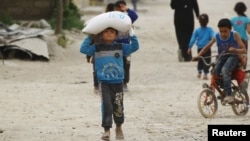The World Food Program said Monday that without an urgent injection of $450 million it will not be able to maintain emergency food assistance this year in Syria, including to people impacted by the recent earthquake.
“Without sufficient resources, we will have to do cuts,” said Ross Smith, WFP Deputy Country Director for Syria. “We will have to cut significantly the number of people we provide support to, and that’s going to come on top of an earthquake crisis and an economic crisis.”
He told reporters in a video briefing from Damascus that the food agency projects they will have to cut 50-60% of the 5.5 million Syrians they assist monthly if they are not assured of the funds within the next two to three months.
Due to a dozen years of civil war, more than 12 million people are food insecure in Syria and another 3 million are at risk of it. A spiraling economic crisis over the last three years has dragged more Syrians into poverty.
“The average monthly salary in Syria, the family can afford three days' worth of food,” Smith said. “It’s quite shocking, and when you go out on the streets and you see it, you can really see some of the desperation there.”
The February 6 earthquake, which killed at least 5,900 people and injured thousands more in Syria, has only increased the suffering and added to a complex humanitarian response.
WFP was already present across the country, had supplies in warehouses and was able to reach people in the immediate aftermath. Since the quake, Smith said WFP has provided ready-to-eat meals and other rations to 1.5 million Syrians in the quake affected areas — both in government controlled and opposition held areas.
On February 13, the government of President Bashar al-Assad agreed to temporarily open two additional border crossings from Turkey into Syria in order to help humanitarians speed supplies to the hardest hit areas. Since then, Smith said WFP is using them, and along with the one existing crossing point, more than 400 aid trucks have crossed, including at least 190 from the food agency.
For years, the Syrian government has insisted that the U.N. and its partners should move aid across conflict front lines from Damascus, but Smith and other U.N. officials have confirmed that since the quake not a single crossline convoy has received the necessary permissions and guarantees to move.
“We are standing by, and we are ready to move with convoys from Aleppo crossline,” Smith said. “It’s important all partners with influence keep pushing for this.”
WFP Executive Director David Beasley was in the region over the weekend, and he called for local authorities to work with humanitarians to improve crossline access.
The WFP chief also joined an aid convoy going through the Bab al-Hawa border crossing from Turkey into northwest Syria. He described the situation in Syria as a “catastrophe on top of a catastrophe.”
The U.N.’s pre-earthquake 2023 humanitarian appeal for Syria was $4.5 billion, which has only been 4% funded.




